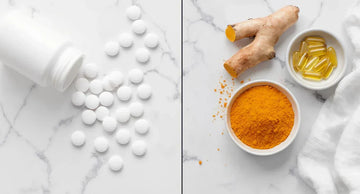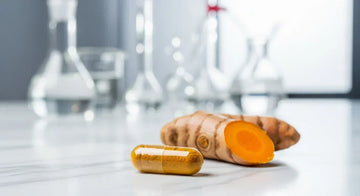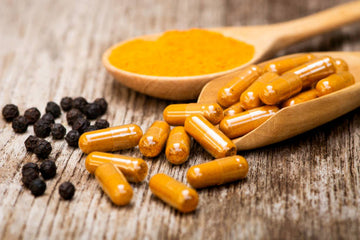For more than 50 years, ibuprofen has been the standard way to treat pain and swelling. Researchers are looking into natural alternatives that work just as well, though, because people are becoming more worried about their long-term safety.
Recent clinical trials have looked at curcumin (the active ingredient in turmeric) and ibuprofen side by side for different types of pain. The results show that bioavailable curcumin can work as well as ibuprofen but with a different safety profile.
This evidence-based comparison looks at the research, safety data, and practical issues to help you make a smart choice about how to deal with your pain.
Table of Contents
- What is Ibuprofen? Understanding NSAIDs
- What is Turmeric? The Science of Curcumin
- Head-to-Head Comparison
- What Clinical Studies Actually Show
- Safety Profile Comparison
- Why Most Turmeric Supplements Don't Work
- When to Choose Each Option
- Evidence-Based Dosage Guidelines
- Critical Drug Interactions
- The Bottom Line
- Frequently Asked Questions
Key References
- 2014 Knee OA Study: Kuptniratsaikul V, et al. Clin Interv Aging. 2014;9:451-8. PMID: 24672232
- 2012 RA Pilot Study: Chandran B, Goel A. Phytother Res. 2012;26(11):1719-25. PMID: 22407780
- 2013 NSAID Risks: CNT Collaboration. Lancet. 2013;382(9894):769-79. PMID: 23726390
- 2020 Exercise Recovery: Fernández-Lázaro D, et al. Nutrients. 2020;12(2):501. PMID: 32075287
- Theracurmin Bioavailability: Sasaki H, et al. Biol Pharm Bull. 2011;34(5):660-5. PMID: 21532153
What is ibuprofen? What NSAIDs Are
Ibuprofen is a type of drug known as a nonsteroidal anti-inflammatory drug (NSAID). Since it was first used in the 1960s, it has become one of the most popular pain relievers in the world.
How Ibuprofen Works
Ibuprofen stops COX-1 and COX-2 enzymes from making prostaglandins, which are chemicals that cause pain, fever, and inflammation. Ibuprofen works quickly and well to ease these symptoms by blocking these enzymes.
Some common uses are:
- Headaches and migraines
- Pain from arthritis
- Aches in the muscles
- Cramps during your period
- Lowering fever
- Pain after surgery
What is turmeric? The Science Behind Curcumin
The Curcuma longa plant gives us turmeric, a golden spice. Curcumin, its active ingredient, has been used in traditional medicine for more than 4,000 years.
How Curcumin Works
Curcumin works in more than one way, unlike ibuprofen, which only works in one way:
- Selective COX-2 inhibition: Stops inflammation without hurting COX-1, which protects the stomach lining.
- NF-κB suppression: stops a key regulator of inflammation.
- Activity as an antioxidant: Stops free radicals from hurting tissues and causing pain.
- Changing cytokines: Decreases signaling molecules that cause inflammation
Head-to-Head Comparison
| Factor | Ibuprofen | Turmeric/Curcumin |
|---|---|---|
| Mechanism | Blocks COX-1 & COX-2 | Multiple pathways, shows higher affinity for COX-2 than COX-1 in vitro |
| Onset of Action | 30-60 minutes | Therapeutic benefit emerges over days-weeks |
| Duration | 4-6 hours | Single dose half-life: 1-3 hours |
| Effectiveness | High for acute pain | Comparable pain reduction in small OA/RA trials |
| Stomach Issues | Common (ulcers, bleeding) | Lower GI adverse event rate vs NSAIDs |
| Heart Risks | Increased with regular use | Early pre-clinical signals only |
| Kidney Effects | Can damage with long-term use | Pre-clinical protective signals |
| Cost per Month | $5-15 | $20-60 (quality varies) |
What Clinical Studies Really Show
Study 1: Knee Osteoarthritis (2014)
Published in: Journal of Clinical Interventions in Aging
Participants: 367 patients with knee osteoarthritis
Duration: 4 weeks
Results:
- Curcumin group (1,500mg/day): Pain relief similar to ibuprofen
- Group taking ibuprofen (1,200 mg/day): More problems with the stomach and intestines
- Satisfaction of the patient: More in the curcumin group
Key Finding: "Curcumin worked just as well as ibuprofen for pain and functional improvement, but it was easier on the stomach."
Study 2: Rheumatoid Arthritis (2012)
Published in: Phytotherapy Research
Participants: 45 rheumatoid arthritis patients
Duration: 8 weeks
Results:
- Curcumin group: 44% reduction in Disease Activity Score
- Diclofenac group (NSAID): 42% reduction
- Zero adverse events in curcumin group vs. 14% in NSAID group
Study 3: Exercise Recovery Systematic Review (2020)
Published in: Nutrients
Type: Systematic review of 11 studies on curcumin and exercise-induced muscle damage
Important Results:
- Taking curcumin (150–1500 mg/day) lowered signs of muscle damage
- Lower levels of inflammatory markers (IL-6, TNF-α, CRP)
- Better muscle function and subjective pain scores
Important: These studies don't compare ibuprofen directly.
The Hidden Dangers of Ibuprofen
A 2013 study in The Lancet looked at 639 trials and found that taking NSAIDs regularly raises:
- 30% higher risk of heart attack
- Risk of heart failure is twice as high.
- 2–4 times more problems in the upper GI tract
The FDA now says that all NSAIDs must have black box warnings about the risks to the heart and stomach.
The Safety Profile of Turmeric
Curcumin, on the other hand, has been shown to be very safe:
- Doses up to 8g daily have been tested without serious adverse effects
- No organ toxicity reported in long-term human studies
- Pre-clinical studies suggest potential protective effects, though human outcome data is limited
Some people (less than 5% of users) may have mild side effects, such as:
- Mild digestive upset
- Yellow stool
- Headache (rare)
Why Most Turmeric Supplements Don't Work
Most articles won't tell you this, but here's the catch: Standard turmeric supplements don't get into your body very well. Your body can only take in about 1% of regular curcumin.
Common "Solutions" and Their Issues
Black Pepper (Piperine): It can make things 2,000% more absorbent, but new studies from 2025 show that it can damage the liver and interact with drugs.
Formulations Based on Fat: Mixing with oils helps, but absorption is still uneven and limited.
The Nano-Curcumin Technology That Changes the Game
Modern nano-formulation technology makes curcumin particles that are 1000 times smaller than regular supplements.
- 35x better absorption than regular curcumin
- Water-soluble for consistent uptake
- No piperine needed (avoiding safety concerns)
- Sustained release for all-day relief
Pro Tip: When comparing turmeric to ibuprofen, only nano-formulated or highly bioavailable curcumin supplements provide therapeutic equivalence. Standard turmeric powder or basic supplements won't deliver clinical results.
When to Pick Each Option
Pick Ibuprofen When:
- You need relief right away for an acute injury or trauma
- Severe headache or migraine that needs to be treated right away
- Pain after surgery (with medical supervision)
- High fever that needs quick reduction
- Short-term use only (less than 10 days)
Pick Turmeric/Curcumin When:
- Long-term problems like arthritis or back pain
- Managing inflammation every day
- Recovery from sports and soreness from working out
- Pain management for a long time is necessary.
- You are at risk for heart disease or GI problems.
- Your goal is to stay healthy.
Dosage Guidelines Based on Evidence
Important: Before making any changes to how you deal with pain or starting a new supplement routine, you should always talk to your doctor.
How much turmeric/curcumin to take
- Standard curcumin: 1,000–1,500mg per day (not very well absorbed, but effective in OA trials)
- Enhanced formulas: 500 to 1,000 mg a day
- Nano-curcumin: 100–300 mg a day (about 27 times more bioavailable than Theracurmin studies)
- Timing: Take with meals to help your body absorb it better.
- Length: It will take 4 to 8 weeks to see full effects.For Comparison - Ibuprofen Dosing
Over-the-counter dose: 200 to 400 mg every 4 to 6 hours
- Maximum daily: 1,200mg (OTC) or 3,200mg (prescription)
- Duration: Limit to 10 days without medical supervision
Important Drug Interactions
Before taking turmeric with any other medicines, always talk to your doctor or pharmacist.
Turmeric Can Interact With:
- Blood thinners (warfarin, aspirin, clopidogrel)
- Diabetes medications (may enhance blood sugar lowering)
- Acid-reducing drugs (may increase stomach acid)
- Chemotherapy (consult oncologist)
Ibuprofen Interactions Include:
- Blood pressure medications (reduces effectiveness)
- Antidepressants (increased bleeding risk)
- Alcohol (increased GI bleeding risk)
- Other NSAIDs (don't combine)
The Bottom Line
Recent studies show that bioavailable curcumin can work as well as ibuprofen for some types of chronic pain and inflammation, especially arthritis. The most important thing to think about is bioavailability. Most turmeric supplements don't reach therapeutic levels.
Ibuprofen is still useful for short-term pain relief, but curcumin may be better for long-term treatment of chronic inflammatory conditions. Depending on the situation, each has its own benefits.
You should make the choice based on your individual needs, health issues, and risk factors. Talking to a doctor can help you figure out which option is best for your situation.
Want a turmeric supplement that is easy for your body to use?
OurJrney's Nano-Turmeric uses cutting-edge nano-formulation technology to absorb about 27 times better than regular supplements (like Theracurmin, which has been studied in clinical settings). This makes it a good choice for people who want to get therapeutic benefits from curcumin.
Frequently Asked Questions
This article is for educational purposes only and is not intended to diagnose, treat, cure, or prevent any disease. Always consult with a healthcare professional before making changes to your pain management routine.







